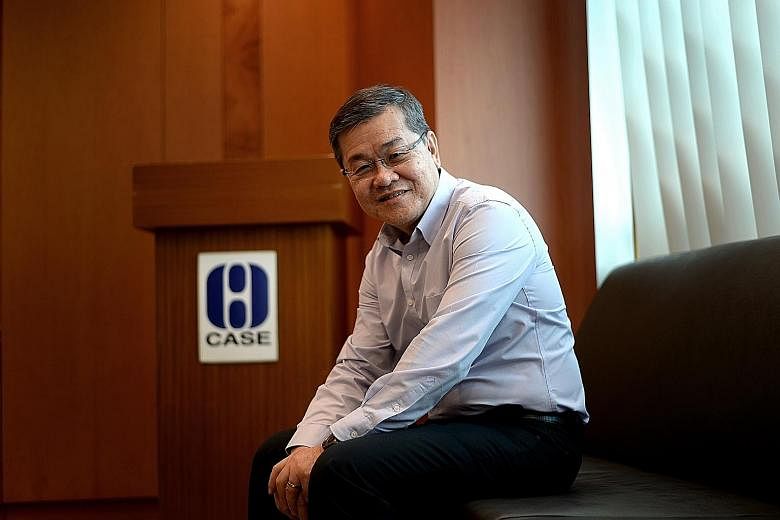Barely a year into his new job as chief of Singapore's consumer watchdog in 2003, Mr Seah Seng Choon came face to face with 700 aggrieved consumers.
They arrived at his office shouting and banging tables, having bought policies from insurance giant AIA under the impression that they would not have to pay premiums after a "critical year", only to be told later that they had to.
It was an overwhelming period for his team of 10 staff, who prepared a class-action lawsuit to take on AIA, one of the biggest multinational corporations in Singapore then, recalled Mr Seah, 64.
"But we were not cowed," he said. "We need to do the right thing even if we're facing a giant."
This maxim guided him through his 15-year stint as executive director of the Consumers Association of Singapore (Case). He stepped down on Jan 1 to be replaced by Mr Loy York Jiun, 43, who previously held various senior appointments within the National Trades Union Congress (NTUC).
Mr Seah's tenure saw many highs such as the passing of consumer protection laws in 2004 and falling consumer complaints, as well as lows such as the Jover Chew saga.
But the AIA case in particular left a deep impression as it was the first major saga he handled.
"I was new in the consumer world and it came as a challenge to the way we did things at Case," said Mr Seah, who had been executive secretary of the Food and Beverage Industrial Workers' Union as well as director of the NTUC Skills Development Department.
Eventually, AIA relented and offered compensation to those affected. But it was just the beginning of a series of challenges that tested Mr Seah's mettle.
Starting in 2009, he spent three years in and out of court after two private schools sued Case for what they said was their wrongful suspension from the CaseTrust for Education scheme administered by Case.
Case found that the two schools did not insure the tuition fees of their new foreign students, which violated the conditions of the scheme. It suspended the schools from the scheme and publicised the news on its website.
"The companies were very angry and wrote to us to say that we were abusing our power and wanted us to apologise as a condition to not sue us. I still have the letters from the companies," said Mr Seah, who had to defend Case's actions in court. "But I think we shouldn't be apologetic for doing the right thing."
Case won the lawsuits.
But some challenges came from within. Mr Seah recalled that when he first joined Case, he wanted to test the quality of products, such as toys and energy-saving bulbs.
But his staff hesitated. "Our own people told me 'this is not how it's done here'. We had no budget to do testing," said Mr Seah. "But we should not limit our potential to protect consumers."
He went knocking on the doors of testing houses and convinced five firms to provide testing at discounted rates or for free.
Mr Seah believed that Case's findings of high levels of toxic chemicals in toys influenced the authorities' decision to introduce new safety rules for general consumer goods in 2011.
His lowest point came in 2014, when it emerged that Jover Chew, who was then a mobile-phone shop owner in Sim Lim Square, was blatantly cheating customers.
A video of a Vietnamese tourist, kneeling and begging a shop assistant for his money, went viral. The tourist had been told to pay an additional $1,500 for the warranty of a $950 iPhone 6 that he had already paid for, or risk losing both the phone and $950.
There was a huge public outcry.
"We were held up like some organisation that's toothless. We were quite low in our morale when it happened," said Mr Seah.
But unknown to the public then, Case had been battling the problem, such as putting up a blacklist of errant retailers in the mall. But the retailers retaliated by hiding their signboards to escape detection.
"It was a trying time. We persevered all these years to do our best within the ambit of the law to protect consumers," said Mr Seah.
Reflecting on the incident, he said Case could have done better to communicate with the public.
Singapore Polytechnic senior retail lecturer Sarah Lim noted that Case became more active during Mr Seah's tenure. "To the layman, Case was like a place to complain to. But after the Sim Lim Square incident, Case was more active and used its authority to tell the mall what to do."
Case had written to the mall asking it to make sure landlords enforce stricter rental pacts, a suggestion that the mall later took up.
Mr Seah, who will now take on the role of Case's adviser, will continue to push for fair treatment of consumers behind the scenes. He will train staff, represent Case at international meetings and assist his successor Mr Loy in his transition.
Mr Seah, who is married with three children, said: "I'm not going to disappear anytime soon.
"For the organisation to remain relevant, we have to keep very close to the ground and feel the heartbeat of the marketplace."


